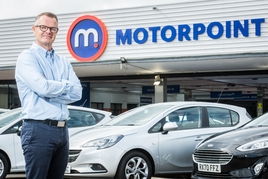Motorpoint has been cutting jobs, reducing stock purchase costs and halting its expansion plans as it fights to stem financial losses which the national car supermarket chain blames on difficult macroeconomic conditions.
In the spring its underlying pre-tax losses mounted to £3.1 million, but its “swift and decisive action” meant it had reduced this to a £600,000 pre-tax loss by the end of the summer.
It will announce Motorpoint’s half-year financial results next month but in a trading statement it said it has incurred a one-off charge of around £1 million relating to redundancy costs, and excluding a £5.3m interest expense it recorded an underlying operating profit of £1.6m.
Mark Carpenter, CEO of Motorpoint, said: “The impacts of high inflation, interest rates, and consumer uncertainty continue to affect demand for used cars. We have responded by reducing our cost base and expanding our retail criteria to help customers find the car of their choice at a price they can afford.
 “We have successfully preserved cash while making progress on selective strategic initiatives, and are well positioned to emerge from this difficult macroeconomic cycle a leaner and more agile business, ready to seize the significant opportunity as market conditions improve.”
“We have successfully preserved cash while making progress on selective strategic initiatives, and are well positioned to emerge from this difficult macroeconomic cycle a leaner and more agile business, ready to seize the significant opportunity as market conditions improve.”
Motorpoint has traditionally focused on retailing nearly-new and young-used cars, which are in short supply following three years of a depressed new car market and high vehicle costs.
Its update reveals Motorpoint has broadened its selling criteria to include vehicles up to five years old and 50,000 miles “to help our customers find the right vehicle in accordance with more constrained household budgets”.
It suggests this is a temporary tactic, as it adds: “We anticipate used values will gradually align to historic levels as new car supply continues to improve which will further enhance affordability for our customers.”
Having opened its 20th car dealership, in Ipswich, during May, the car supermarket group has paused further openings for now.
“Despite the current market challenges, we remain committed to our long term growth aspirations, while focusing in the short term on margin improvement, cost base management, and cash generation,” said the company. It ended H1 with net cash at £11m (up from £2.2m in H1 last year) and said it has a further £35m funding facility available so it remains resiliient in the difficult conditions.
